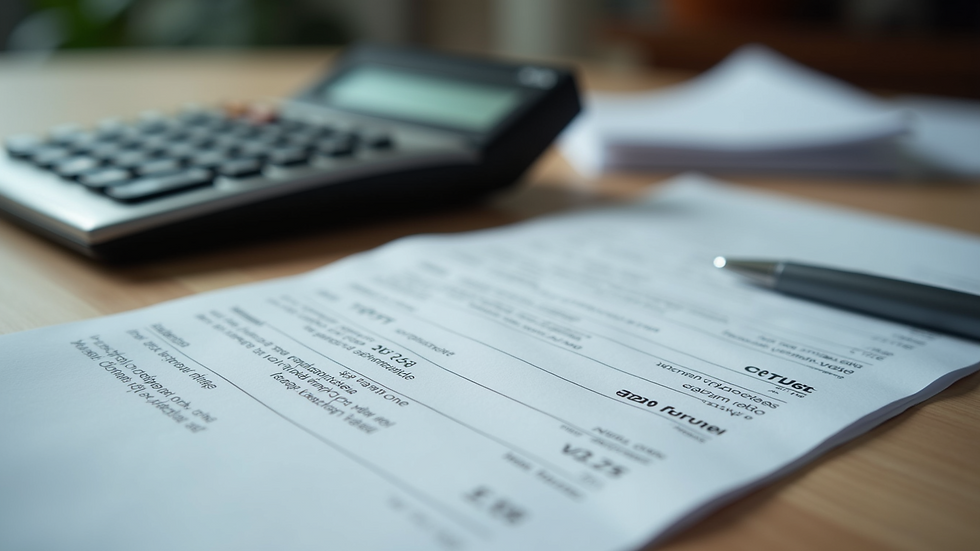Tax Planning Tips for Freelancers
- Nov 17, 2025
- 4 min read
Let me start with a confession: when I first started freelancing, taxes felt like a giant, scary monster lurking in the shadows. I knew I had to deal with them, but the whole process seemed overwhelming. Sound familiar? If you’re nodding, you’re not alone. Freelancing comes with freedom, flexibility, and yes, a whole lot of responsibility—especially when it comes to managing your money and taxes.
But here’s the good news: with a little know-how and some smart strategies, you can take control of your finances and avoid those last-minute tax headaches. I’m here to share some freelancer tax tips that have helped me stay on top of my game. Ready? Let’s dive in.
Why Freelancer Tax Tips Matter More Than You Think
Freelancing means you’re your own boss. That’s awesome, but it also means you’re responsible for everything—especially taxes. Unlike traditional jobs where taxes are automatically deducted, freelancers have to track income, expenses, and pay taxes themselves. Miss a step, and you could face penalties or end up paying more than you should.
Here’s the kicker: many freelancers don’t realize they can actually reduce their tax bill by planning ahead. It’s not just about paying taxes; it’s about smart tax planning for freelancers that keeps more money in your pocket.
Think about it this way: would you rather scramble to gather receipts in April or have everything organized and ready months in advance? I know which one I prefer.

Top Freelancer Tax Tips to Keep You Ahead
Let’s get practical. Here are some of the best tips I’ve learned and used to make tax season less stressful and more manageable.
1. Keep Detailed Records from Day One
This might sound obvious, but you’d be surprised how many freelancers don’t keep good records. Every invoice, receipt, and expense matters. Use apps or spreadsheets to track your income and expenses as they happen. Trust me, it saves hours of frustration later.
Pro tip: Separate your business and personal bank accounts. It makes tracking income and expenses way easier and cleaner.
2. Understand What Expenses You Can Deduct
Freelancers can deduct a lot of expenses that traditional employees can’t. This includes:
Home office costs (a portion of rent, utilities, internet)
Equipment and software
Business travel and meals
Marketing and advertising
Professional development (courses, books)
Knowing what counts as a deductible expense can significantly lower your taxable income. I once missed out on deducting my home office setup because I didn’t realize it qualified. Don’t make the same mistake!
3. Set Aside Money for Taxes Regularly
One of the biggest mistakes freelancers make is spending all their income and then scrambling to pay taxes. Instead, set aside a percentage of every payment you receive. A good rule of thumb is to save about 25-30% for taxes, but this can vary depending on your income and location.
I use a separate savings account just for taxes. When I get paid, I immediately transfer the tax portion there. It’s like paying yourself first.

4. Pay Estimated Taxes Quarterly
Unlike traditional employees, freelancers usually have to pay estimated taxes four times a year. Missing these deadlines can lead to penalties. Mark your calendar for April, June, September, and January payments.
If you’re unsure how much to pay, use last year’s tax return as a guide or consult a tax professional. It’s worth the investment to avoid surprises.
5. Consider Hiring a Tax Professional
I get it—hiring a tax pro sounds expensive. But think of it as an investment. A good accountant can help you maximize deductions, avoid mistakes, and save money in the long run. Plus, they keep you compliant with tax laws that change every year.
If you’re just starting out, many tax pros offer free consultations. Take advantage of that to see if it’s a good fit.
Tools and Apps That Make Tax Time Easier
Technology is your friend here. I’ve tried a bunch of tools, and some really stand out for freelancers:
QuickBooks Self-Employed: Tracks income, expenses, and mileage automatically.
FreshBooks: Great for invoicing and expense tracking.
TurboTax Self-Employed: Guides you through filing with freelancer-specific questions.
Expensify: Snap photos of receipts and organize them instantly.
Using these tools can save you hours and reduce errors. Plus, they often integrate with your bank accounts, making record-keeping seamless.
How to Stay Motivated and Avoid Tax Stress
Let’s be honest—taxes aren’t fun. But they don’t have to be a source of dread. Here’s how I keep my sanity:
Break it down: Don’t try to do everything at once. Spend 15 minutes a day organizing receipts or updating your spreadsheet.
Celebrate small wins: Finished your quarterly payment? Treat yourself to a coffee.
Stay informed: Follow blogs and podcasts about freelancing finances. Knowledge is power.
Join a community: Freelance forums or local groups can offer support and advice.
Remember, tax planning is a marathon, not a sprint. The more consistent you are, the easier it gets.
Your Next Step: Take Control of Your Financial Future
If you want to dive deeper into tax planning for freelancers, there are tons of resources out there designed to help you master your money. The key is to start now, not later.
Freelancing is a journey full of ups and downs, but managing your taxes well can give you peace of mind and more freedom to focus on what you love. So grab your receipts, open that spreadsheet, and take charge of your financial future today.
You’ve got this.
Happy freelancing and smart tax planning!




Comments